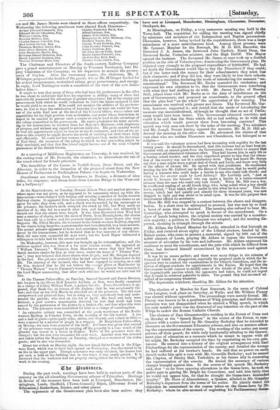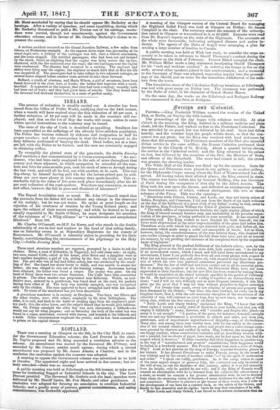Igbe tiltobintes.
During the past week, meetings have been held in various parts of the 'country on the all-absorbing Government scheme of Education. Meetings in favonr of the measure have been held at Liverpool, Manchester, Bir- mingham, Leeds, Sheffield, (Town-Council) Ripon, (Diocesan Board of • Education,) Rotherham, Exeter, and ether places.
- The epponents of the Government plan have also been active: they have met at Liveepeek Manchester, Birmingham, Gloucester, Doncaster; Stockport, 8re.
At Birmingham, on Friday, a very numerous meeting was held in the Town-hall. The requisition for calling the meeting was signed chiefly by ministers and members of the Independent and Baptist persuasions. Discussion, however, being invited by the requisitionists, there was a large attendance of a more miscellaneous kind. Among those present, were Mr. Spooner, 'Member for the Borough, Mr. M. D. Hill, Recorder, the Reverend J. A. James, the Reverend John Garbett, Rural Dean, the Reverend Bache, Unitarian minister, and the High Bailiff. The Mayor opened the business. The Reverend Mr. James at once took up a decided position on the side of Voluntaryism; denouncing the Government plan. He objected very strongly to the proposed expenditure of 2,000,000/. He- had no doubt the Government would like to buy the Dissenters if they could; but if the latter took the money for their schoolmasters they must lose their character; and if they did not, they were likely to lose their schools. He moved a resolution declaring the mode of introducing the measure "un- constitutional" The Reverend Mr. Bache seconded the resolution; awl expressed his own objection to be, that the Government were interfering with what they had nothing to do with. Mr. James Taylor, of Moseley Hall, joined issue with Mr. Bache as to the duty of interference on the part of Government; and proposed an amendment, to the general effect that the plan had "on the whole" the approbation of the meeting. The amendment was received with groans and hisses. The Reverend Mr. Gar- bett, however, supported it; and denied that the mode of introducing the measure was unconstitutional, although he thought that an act of Parlia- ment would have been better. The Government educated convicts; and could it be said that the State which did so had nothing to do with that education which would prevent them from, becoming convicts? This speech was very soon cut short by the noise of the meeting. Two ministers and Mr. Joseph Sturge having opposed the measure, Mr. M. D. Hill ad- dressed the meeting on the other side. He advocated the claims of that vast class who are neither Dissenters nor Churchmen, but belonged to no religion— It was said the voluntary system had been increasing with rapidity for the last twenty years. It should be remembered, that this increase had at least been co- ineident with an annual grant from the Government; from which he argued that Government aid stimulated voluntary effort. They had known him in early life as a Sunday school teacher, and his own experience proved to him that the educa- tion of the country was net in a satisfactory state. They had heard Mr. Sturge say that a man might learn a great deal of Greek and Latin, and know very little of the affairs of human life. He agreed with that gentleman. He recollected hearing the late Mr. Cobbett say in the House of Commons, that he would prefer having a labourer who could make a hurdle to one who could talk Greek: and what was the answer made by Lord Althorp? His Lordship said, "And so would I; because the labourer who can make a hurdle is a better-educated labourer than the man who could only talk Greek." When Mr. Hill was a boy, he recollected reading of an old Greek king, who, being asked what a boy should learn, replied, "That which will be useful to him when he is a man." This dis- covery, which had laid quietly and silently for three thousand years, was now dragged to light and was about to be acted upon. It was for this purpose that Government offered its assistance.
Here Mr. Hill was stopped by a contest between the cheers and disappro- bation. In a short time he attempted to proceed, but was met by so loud a burst of noise that he desisted. The meeting also refused to hear Mr. Gutteridge, who attempted to speak in favour of the amendment. On a show of bands being taken, the original motion was carried by a consider- able majority; a petition to Parliament was adopted; and the meeting dis- persed, shouting in triumph through the streets.
Mr. Aldam, the Liberal Member for Leeds, attended in that borough on Friday, and received about eighty of the Liberal electors, headed by Mr, Baines senior, who came to present a memorial, signed by 880 out of the 4,000 electors of Leeds, praying Mr. Aldam to oppose the Government measure of education by his vote and influence. Mr. Aldam expressed his readiness to meet his constituents, and the pain with which he differed from them; but declared himself unconvinced by the arguments used against the measure—
It was by no means perfect; and there were many things in the minutes of Council of which he disapproved, especially the proposed mode in which the In- spectors were to conduct the examinations in the Church Catechism and the se- lection of diligent students for appointments in the Excise. He hoped that the Government would consent to modify some of the details of the plan; bat, from the impracticable position which the opponents had taken, he could not expect that it could be rendered palatable to them. The ground they had assumed ad- mitted of no compromise whatever. The deputation withdrew, thanking Mr. Aldam for his attention.
The election of a Member for East Somerset, in the room of Colonel Gore Langton, took place on Saturday, at Wells; and Mr. William Pinney was elected without opposition. The proceedings were merely formal. Mr. Pinney was known to be a gentleman of Whig principles, and therefore ex- pectation was not disappointed when he uttered a Whig speech, in which the only notable point was the disavowal of any intention on the part of the Whigs to endow the Roman Catholic Church.
The electors of East Gloucestershire residing in the Forest of Dean met on Monday at the "Speech House" in the centre of the Forest, in com- pliance with a notice issued by Mr. Grantley Berkeley that he intended to discourse on the Government Education scheme and also on matters affect- ing the representation of the county. The wording of the notice put many persons off their guard; for while only incidentally alluding to the Govern- ment plan of education as a measure which he meant to oppose with all his might, Mr. Berkeley occupied the time by expatiating on his own grie- vances. He entered into a history of the original arrangement with Earl Fitzhardinge for the representation of the county, and detailed the wrongs he had suffered at his brother's bands. He said that no power on earth should make him split a vote with Mr. Grenville Berkeley; and he named Mr. Clayton, of Bierley Hall, Yorkshire, as his future ally in contesting the representation of the county. He denied the accuracy of -various charges brought against him. In the course of his speech Mr. Berkeley said, that "so far from opposing alterations in the Game-laws, he took an active part in gaining Mr. Bright his Committee, and told him fairly that he weuld not oppose him, for that he thought the Game-laws demanded inquiry." Mr. Hunt of .Almondsbury, a Quaker, alluded to Mr. Grantley Berkeley's departure from the terms of his notice. He plainly stated the objection he entertained to the course taken on the Game-laws by Mr. Berkeley; whom he also accused of neglecting his Parliamentary duties.
Mr. Hunt concluded by saying that he should oppose Mr. Berkeley at the hustings. After a variety of speeches, and some squabbling, during which Mr. Berkeley threatened to pull a Mr. Trotter out of his carriage, resolu- tions were carried, though not unanimously, against the Government education scheme, and in favour of Mr. Grantley Berkeley's claims to re- present the county.
A serious accident occurred on the Grand Junction Railway, a few nffles from Crewe, on Wednesday sennight. As the express down-train was proceeding at its usual rapid rate a jerking of the carriages was felt, then a violent concussion, and the train stopped. The terrified passengers, who had been cut and bruised by the shock, found on alighting that the engine was lying across the up-line, shattered, with the fire scattered over the road; the two carriages next the engine i were overturned. The disaster had occurred n a cutting. The engineer and stoker were lying near the engine; the engineer so much hurt that at first his life was despaired of. The passengers had to take refuge in two adjacent cottages, as several hours elapsed before another train arrived to take them forward.
Bolland, a youth of nineteen, and Maria Wilson a girl of seventeen, have been found drowned in the river Aim, at Leeds; the bodies tied together with a hand- kerchief. It appeared at the inquest, that they bad been courting; recently, both had been out of work; and they had given hints of suicide. The Jury found that the deceased had drowned themselves, in a state of perfect sanity.



























 Previous page
Previous page